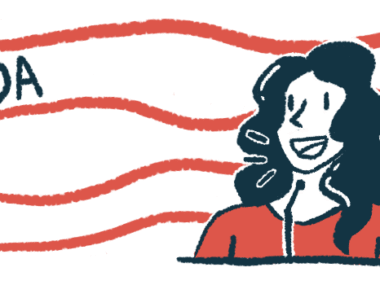A short play shows me how to turn frustrations into growth
Talking with actor and CMTer Zoé Badovinac about her play 'Differently Abling'
Written by |

A woman walks into a coffee shop, orders a coffee, and looks around for the man she’s agreed to meet — her date. When she spots him waving at her from a table he’s found for them, she starts walking toward him. As she walks, it becomes clear she doesn’t have full control over her feet, as they flop around somewhat awkwardly. The woman has Charcot-Marie-Tooth disease (CMT).
But as anyone living with CMT knows, the chronic condition doesn’t just reshape your body in physical ways, though there is plenty of that. CMT — and the way society treats disabled folks — can also shape how many CMTers carry themselves in the world. Many of us can’t help but notice how others view and treat us. It’s a kind of ever-present vigilance.
The woman in the coffee shop knows these feelings well. And these feelings, along with her disability and the way she’s been treated her whole life, will certainly play a big role in how this first date will go.
This is the opening scene of “Differently Abling,” a short play written by actor and CMTer Zoé Badovinac. Last month, I had an opportunity to get a peek at the play and chat with Badovinac. I got to hear about how her play came to be, and we swapped stories about how our encounters with ableism have affected our lives.
For example, these frustrating encounters can cause us to dread or fear how we’ll be treated whenever we meet someone new. This is something Badovinac explores in her play.
Going with what you know
Although she didn’t set out to write a disability narrative for her first play, she said that it felt appropriate to write something genuine and personal.
“You go with something you know,” Badovinac said. “[When writing,] go to your own life experiences. And make it funny as well.”
Badovinac’s humor stood out to me, and I thought it was an incredibly important aspect of her play. It highlights something that’s been on my mind for a while.
While most CMTers know the struggle of managing a chronic condition and dealing with everyday ableism, it can sometimes be challenging to redirect those frustrations into something productive. But I think Badovinac has done exactly that with her play.
Wholehearted laughter, for example, is always welcome. Awareness, education, and the arts are important. And introspection is essential for personal growth.
Granted, it’s not always easy. Redirecting our frustrations can take time and require us to get out of our own heads. And as Badovinac was quick to note in our conversation, it’s easy for all of us — disabled or not — to get caught up in our own affairs.
“An able-bodied person can be insensitive and maybe a bit ignorant about physically disabled people,” she said. “But equally, we [CMTers] can be just as ignorant about neurodivergent people … and other groups.”
Indeed, it’s an important lesson for everyone to remember. And I’m glad others will get to hear it when Badovinac shares her play as part of a short play festival Feb. 9-12 at The Players Theatre in New York.

(Courtesy of The Players Theatre Short Play & Musical Festival)
Note: Charcot-Marie-Tooth News is strictly a news and information website about the disease. It does not provide medical advice, diagnosis, or treatment. This content is not intended to be a substitute for professional medical advice, diagnosis, or treatment. Always seek the advice of your physician or other qualified health provider with any questions you may have regarding a medical condition. Never disregard professional medical advice or delay in seeking it because of something you have read on this website. The opinions expressed in this column are not those of Charcot-Marie-Tooth News or its parent company, Bionews Services, and are intended to spark discussion about issues pertaining to Charcot-Marie-Tooth.







Liane Schirmer
I just saw this great article! I'm a CMT-er and an actress in L.A. I'd love to get in touch with the writer and read the play or see a video. Is there a way you could put us in touch. Thank you!
Carol Fleenor
I am a close friend of a man who has been diagnosed with CMT.
His family has had the hereditary disease and several other family have had it and have passed away.and several siblings have the diagnosis as well. I am a Retired RN of 45 years and I never heard of this disease. I am very interested in the play and any suggestions on how to help him. Encouragement and love and assistive devices I feel will him him. Please send me a copy of the play about this disease and other suggestions that will help him.
Thank you.